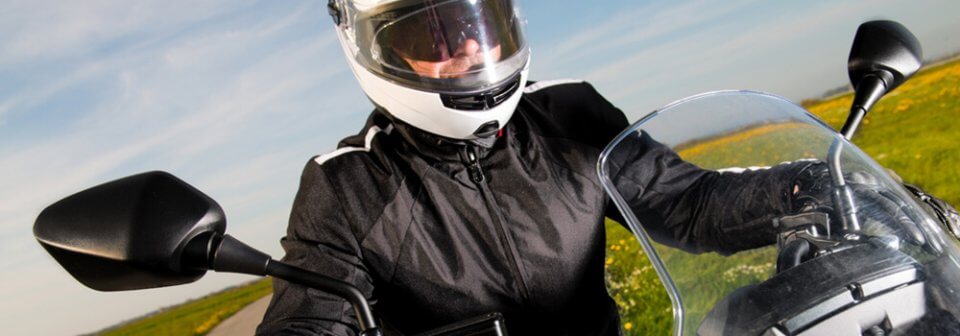
Operating a motorcycle and driving a car are two entirely different things. While motorcycles can be a fun, quick, and convenient way to travel, there are higher risks involved compared to driving in cars. Due to having less impact protection, many motorcycle accidents become fatal. Should a motorcyclist get into a motorcycle crash, they are 27 times more likely to die compared to those who get into car accidents. That’s not even counting those who survive a motorcycle wreck, but suffer serious injury.
While it is important to get the best motorcycle insurance plan for you so you can thoroughly cover any possible damages and medical costs, it’s better to avoid getting into motorcycle crashes to begin with. Accidents happen, but sadly many are preventable.
Follow these tips in order to improve your chances and increase your motorcycle safety. These instructions could make a big difference in preventing a person from getting into a fatal motorcycle accident.
1. Be Aware, Be Focused, Be Alert
It is important that you eliminate as many distractions as you can when riding a motorcycle. Be mindful of your surroundings and other cars around you. A sudden stop, change in traffic speed, or other obstacles could spring up at any moment. Don’t listen to music or fall into a trance while riding. Never operate a motorcycle drunk, sleepy, or sluggish. Even small distractions can lead to serious motorcycle injuries.
2. Assume No Car Can See You
Riding a motorcycle makes you less of a viewable obstacle on the road. Many motorcyclists tend to fall within a car driver’s blind spot. Also, car drivers are subconsciously paying more attention to other cars on the road than motorcycles. Many motorcycle accidents were caused because a car driver didn’t see a motorcycle and thought a motorcycle “came out of nowhere,” even though the motorcyclist was nearby for miles. It’s best to believe that none of the other cars on the road can see you so you don’t make a poor decision based on assumption.
3. Pay Attention to the Wheels of the Cars in Front of You
One useful tip for motorcyclists is to pay attention to the wheels of the cars in front of them. Seeing where the wheel pivots will help you discern where they are going if the car decides to change lanes or make a left turn. It also let’s you know what direction the car is going if it decides to back up near you.
4. Make Sure Your Path is Clear
While you’re observing the wheels of the cars in front of you, check to make sure your path is clear. Many motorcycle crashes are caused by running over fallen tree branches, rocks, potholes, oil spills, or other hazards on the road. While a car could possibly run over these hazards without a problem due to the car’s weight and four-wheel drive, a motorcycle weighs significantly less and requires more balance on two wheels. Look ahead in order to dodge out of hazardous paths or pull over to a stop at a safe place if you see such obstacles ahead.
5. Check Your Mirrors Often
It’s important to frequently check your mirrors to see what’s going on behind you as you ride. While it is important to check your mirrors before changing lanes, this safety tip is more about the other cars on the road. Your mirrors can help you see oncoming cars behind you, so you won’t get startled and overtaken. Cars behind you might also have their blinkers on, trying to warn you of an upcoming merge. Checking your mirrors will also help you better gauge your distance between you and the vehicles around you. This helps create a more accurate buffer between your motorcycle and traffic surrounding you.
6. Keep Your Distance From Cars
If you see a car backing up into your path, slow down and let them finish. If you see a car merging into your lane, give them plenty of space to maneuver. If at a red light, try to stop to the side of the lane so you won’t get rear ended. Stop yourself from driving between cars in a multi-lane road. There is a high risk of a motorcycle wreck if a driver decides to merge or open the car door while you’re traveling between the lanes.
Remember, the drivers in cars are surrounded by a protective metal shell that motorcyclists don’t have. Motorcycle accidents involving a car and a motorcycle colliding are usually more physically costly to the motorcycle rider, regardless of who is at fault. It’s best to steer clear whenever possible.
7. Become a Braking Expert
Using your brakes to avoid a motorcycle crash might seem like a given, but many motorcycle accidents have happened due to the poor reaction time of the rider using the brake. Always keep your hands over the front and rear brakes so you can slow or stop instantly. In fact, many seasoned riders recommend that you find an empty parking lot and practice braking at various speeds, so you and your body can know what to do and what expect if you need to make a sudden stop. The Motorcycle Safety Foundation also provides a motorcycle safety course to help you master braking and maneuverability.
8. Be Mindful of Your Speed
Just because you can usually go faster on a motorcycle, it doesn’t mean you should. Going faster than the speed limit isn’t just against the law, but also prevents you from turning properly. You also might not be able to have enough time to swerve if a person, animal, pothole, or other obstacle appears in your path. If you need to make a tight turn, you’ll have less time to adjust and lean into the turn safely. While riding at high speed can certainly give you a rush, it can easily lead to a fatal motorcycle accident.
9. Maintain Your Motorcycle
It’s important to make sure that your motorcycle is running efficiently and that all aspects are top notch. Regularly check your brakes to make sure they are reliable in a clutch. Change your tires and rotate them regularly to ensure a proper grip onto the road to prevent skidding and sliding. Change the oil regularly. Take your motorcycle to a mechanic if you notice any weird noises from the engine or have trouble steering. Even the mildest of mechanical issues can lead to motorcycle injuries if left unaddressed.
While following these tips will help protect you from possible injury, it’s important to get motorcycle insurance in order for you and your bike to be fully protected. Freeway Insurance offers free motorcycle insurance quotes to help you find a plan that fits your needs and your budget.



